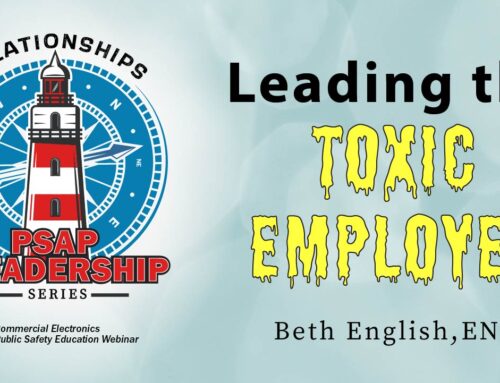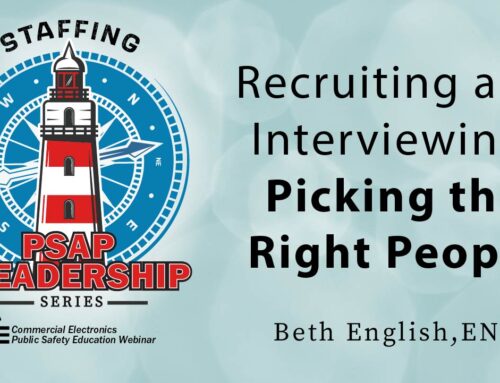Another trainee bit the dust, which means you’re still shorthanded. Why did that happen? What could you have done to change that? Let’s talk about training mistakes you can avoid while developing your Best co-worker.
Video Transcription Below
From Punching Bag to Telecommunicator:
Training Mistakes to Avoid When Developing Your BEST Co-Worker
When I began my career in 9-1-1, my first shift was the midnight shift where I was trained to answer both 9-1-1 and the non-emergency lines. I was then transferred to day shift to learn how to work the NCIC radio. While still on the day shift, I was moved to the main dispatch radio to train. I had been training on this radio for one week when one day, during patrol’s shift change, we had a huge storm come in, and a massive accident occurred at a major intersection. My trainer chose that moment to leave the room and left me alone on the radio. I. Sank. Fast. I didn’t recognize any of the oncoming shift’s voices, because I hadn’t worked with them yet; I had officers checking in and out, back to back, and I had officers checking en route, but not telling me what they were en route to. It was a complete disaster. About 15 minutes later my trainer came back in the room, took the keyboard away from me, and caught up everyone’s status. Afterward, she took me to the ladies’ lounge and commenced to chewing on me for the poor job I had done, telling me I was going to have to pick it up if I wanted to keep my job, and that my DOR would reflect how badly I had done that day.
I was devastated! I cried all the way home and started thinking of other jobs I could do that I could start applying for.
Does this sound familiar to any of you? Have you ever had this done to you? Have you ever done this to someone else?
After I had children, I understood why some animals eat their young, but I’ve never understood why communications centers do. I don’t know of any other profession that treats their new people the way we do. And yes, I know every agency isn’t like that, but enough of them are that it’s a well-known fact. We treat our trainees like punching bags, taking out our frustrations on them, making them pay for our bad attitudes, and basically doing what we can to eliminate them. This is a hard profession to break into, and it’s our fault. What we should be doing is working hard to turn these trainees into our BEST co-workers.
Overworked and Underpaid
You’re working in a Comm center. You’re at 60% capacity. You can’t take your vacation or holiday time because you’re so short-handed and yet, you’re going to lose that time if you don’t take it soon. Then, someone new starts…Yippee! Finally, you’re going to have some help. You might even get to take your RDOs! Do you know what RDOs are?
So, You’ve Hired a New Employee
When your agency hired this new employee, they followed all the right steps to get them hired. They processed the application, did the testing, and then called them to come in for an interview.
In the interview the applicant was told everything about the job, beginning with everything that’s difficult or undesirable. They were told about how hard the job is, about missing holidays, birthdays, anniversaries, and their kids’ games. Shift work was emphasized, and they were told about having days off during the week for the next 150 years.
Then, they were told about the wonderful benefits: the importance of the job and how they will be saving lives and making a difference every day, how the job is different from anything they’ve ever done, how no two days are ever the same, and then they were told about the public safety “family” and the brotherhood with the officers, firefighters, and fellow telecommunicators.
By the time the interview was over, the applicant was ready to start this wonderful job! When their first day came, they were excited and ready to get started. After three months on the job, they turn in their resignation. What happened?
Mistake #1: Inundating Them With Reading Material
So, let’s talk about mistake number one, inundating them with reading material. Imagine you’re the trainee. On your first day, you went through some sort of orientation, got a keycard, a headset, a tour of the facility, and were assigned a trainer. You listened in to some calls and observed the radio operator for the rest of the day. When day two rolled around, the trainer handed you the NCIC manual, the SOP, and the department’s General Orders, and told you to go sit in the corner and read them. And for the next three weeks, you were left alone, ignored, while you read everything the trainer gave you. You may not have to imagine this; it may have happened to you.
Now, let’s say you have no previous experience. After spending the first day reading the NCIC manual, did you run home and tell your family, “Guess what?? I learned today that NCIC is a computerized index of criminal justice information (i.e.- criminal history record information, fugitives, stolen properties, and missing persons)”?What about the SOPs? Did you miraculously learn all the codes and acronyms in that first few weeks just from reading? Or did you sit there and think to yourself, “WHAT have I gotten myself into?”
Reading Is Not the Only Way
For whatever reason, some trainers think that making the trainee read for weeks on end teaches them something. Granted, some people learn that way. But in my 30-something years in 9-1-1, I’ve never had someone tell me to let them just read the book because they learn better that way. Only 2% of the population can do this job, and most of that 2% learn by doing. They learn by physically carrying out the activities rather than by lecture, demonstration, or reading. So, expecting someone to learn just by reading manuals full of acronyms that they have never heard before is unrealistic. And sadly, many agencies do that because they have “always done it that way”, and they wonder why they can’t keep trainees. All I can say is, STOP IT!
Mistake #2: Not Being Ready
Part of welcoming a trainee to their new role is to have everything ready when they come on board. The first thing that must be done is getting them acquainted with the most important places in the work environment. So, you give them a tour of the coffee machine, creamer and sugar location, and show them where the flavored syrups are. You show them the locker area, the Manager’s or Chief’s office, and the Communications center. Then, you get them an access card, an identification badge, and introduce them to their trainer.
If the trainer does her job correctly, she starts explaining to the trainee how everything in the room works. She explains about the email system, payroll, shift assignment, and other pertinent day-to-day details. She will then have the trainee do something easy, like login to his email, only to find that there is no email set up for him. Oops! So, she takes a moment to call the supervisor and/or Manager to get that done, only to find out that the entire IT department is in training this week so it will be sometime next week before it can be done. Ok, let’s move on.
Have Technical Access Ready
For those of you who have ever had to work with the CAD system down, you know how difficult it is to work without your computers. If you can’t log in to SOMETHING when you walk in the door, you can’t do anything. It’s the same way with a trainee. If they can’t log in to their email, phone, or CAD system, the only thing they can do is read the manuals, and we’ve already had that discussion!
It is imperative that all, or most, of the technical access they will need has been set up prior to their first day. Now, with all the different systems in use in a Comm center today, it’s easy to forget something, so you’re going to need a checklist to go by when onboarding a new employee (and that’s onboarding, not waterboarding!). You want to make sure you have your main systems, such as email and phone, on the list, along with all the other logins you will need. Don’t forget the state website logins, NCIC, court systems, mass notification, etc. Some logins won’t be available until after the trainee has started, and those need to be noted, but available on the list so they aren’t overlooked.
Mistake #3: Failure to Provide Relevance
When the trainer finally gets around to working with the trainee, they tell them to start answering calls. As the caller describes their issue, the trainer tells the trainee to enter this here, click on that, double click on this, hit enter. The trainee follows each step as given by the trainer, for each call. This continues on for several weeks until the trainee is able to process the steps for each call.
But what’s wrong with this picture? Is the trainee actually learning anything? Or are they just learning the steps by rote? As a director, I’ve had trainees in Communications who could enter a call, with all the proper steps, but had no idea why they were asking for or entering the information. So, when it hit the fan, they couldn’t think on their feet because they only knew the motions, not the why.
In order to be able to think through situations, trainees need relevance. Telling them what to do, without telling them why they are doing it, is setting them up for failure. It keeps them from actually learning, rather than absorbing by osmosis. So, explain what you are doing and why you are doing it so that they have a point of reference to fall back on when they actually have to start thinking on their own.
Mistake #4: Making the Trainee Your Servant
Once the trainee has started answering the phone somewhat on their own, the trainer shows the trainee how to enter wants/stolen/missing into NCIC. And for the next 6-8 weeks, the trainee enters EVERYTHING. The idea behind this is that the trainee “needs the practice”. So, the trainee ends up doing all the jobs the trainer doesn’t want to do, like entering warrants and the ever-popular protective orders. In one agency, a trainee finally got so fed up with that, he told his trainer he was no one’s b…well you get the idea. The trainee finally revolted, as will others who feel they are being taken advantage of. If you find yourself making your trainee into your servant, take a moment to rethink it. You’re doing this to the detriment of your agency and yourself. Yes, they need the experience, but just because you have been there a couple of years or more, doesn’t mean you too don’t need the practice. Keep in mind, NCIC procedures change regularly. With all the new databases being added almost daily, no one can afford to sit back for a few months and let the trainee handle it all. You need to maintain your skills too, or trust me, audit time is not going to be kind to you, or your agency.
Mistake #5: Making the Trainee Drink From the Firehose
I remember when I was being trained, I learned in phases. I was strictly trained on the phones during my first phase; there was no NCIC added in until I got to phase 2. But back then we only had one computer in the room that accessed NCIC.
Now, you’ve got NCIC access on just about every computer in the room, so call takers can run criminal histories, license plates, and just about every other request the officers can come up with. Trainees are now having to learn NCIC while still learning how to answer the phone. Add EMD or other protocols on top of that and they feel like they are drinking from the firehose. It very quickly becomes overwhelming, and they start doubting themselves even earlier in the game than we old-timers did.
There were times when I was the trainer that I felt like I was the one holding the firehose. So, I could only imagine how they felt being at the other end.
When you’re training someone, try to remember what it felt like when you were the one trying to learn all of that information yourself. You may have it all down now, but you didn’t start out that way. Introduce things in phases. You may want that trainee signed off in 3 months because you have a cruise coming up, but it’s better to have a well-trained co-worker than to have someone else leave because they were inundated with too much information.
Mistake #6: Overtraining/Undertraining
We all have those regular calls that come in daily…calls that have already occurred, like thefts and burglaries, alarm calls, accidents, etc. These are the calls the trainee learns how to process quickly, so after two or three weeks, they are able to answer the non-emergency lines on their own. This is when the trainer should start to sit back a little and give them some room to handle the calls that they can. However, some trainers continue to listen in on every single call, often while standing over the shoulder of the trainee. They will tell the trainee what to enter, what button to click, what to ask the caller, even as the trainee is about to be released from training on that position. This is Overtraining and it’s the result of an over-controlling trainer. They just don’t want to let go. Some trainees are OK with this, but let’s admit it…most of us are type A personalities and having someone listen in to your calls while standing over your shoulder, just ticks you off. It does the same thing to trainees. If you are training someone, and you’ve given them relevance to each of their tasks, give them some room and let them reason through things until or unless you see that they can’t.
Now, that doesn’t mean to go all the way to the opposite side and undertrain. While some trainers like to hang on tight until the very end, others will tell the trainee once what to do for each call type, and then sit back and offer no further help, leaving the trainee to flounder when he really needs help. Then, when the trainee does it wrong, they jump in to chastise him heavily and tells the supervisor or manager that he isn’t going to cut it. Remember my story at the beginning about being left on the radio? This is a great example of undertraining.
If you are a trainer, and you see yourself in either of these descriptions, think very hard about how you are affecting not only the trainees but also your agency. Can you make some changes in your training skills that would benefit all of you?
Mistake #7: Talking Too Much
Have you ever tried to call your wireless provider’s customer service and explain to them the issue you are having, except you can’t get a word in edgewise because they are too busy reading instructions to you from their troubleshooting dialogue? Talking too much is another issue that happens with training that you want to avoid. Yes, I know. I’ve already told you about overtraining, but there is a difference between hanging on to control and talking so much that your trainee can’t even interact with you. As you are giving your trainee instructions on what to do, how to do, and why to do, remember to breathe, take a sip of that flavored coffee, and give them a chance to clarify, ask and demonstrate. You need the break, and they need to be able to cement their new knowledge in their mind.
Mistake #8: Belittling the Trainee
Several trainers I have worked with in the past have told trainees that they aren’t “real people” until they are released from training. Other dispatchers will refuse to talk to trainees until they prove themselves on the job. They belittle them, intimidate them, and basically make them think they are worthless. The trainees don’t want to ask questions because they are so intimidated. They learn early on that asking a question only brings more disdain from the “old hats” as well as the trainers. How can someone learn under those circumstances?
R-E-S-P-E-C-T!
As a trainer, it is your responsibility to not only train the new employees but also to make sure they are able to assimilate into the agency. Letting others talk down to them does a disservice to everyone. The trainees may be new to your agency, but they are still people, not puppets to be used and abused. They should be treated with respect, if for nothing else than passing the background! And even the trainees who aren’t “getting it” need to be treated with respect. Keep in mind that when someone leaves your agency because of the way they were treated, that becomes your agency’s reputation, because the trainees WILL go out and tell others about their experience. And if you think it’s hard hiring people now, just let it get out that you treat your new people like that, and no one will want to apply. One agency had such a bad reputation for the way they treated their new people, that everyone in the area knew about it, and they couldn’t recruit anyone with experience within a 150-mile radius. Think of how hard that made it to hire new people!
Mistake #9: Bullying
If your trainees feel bullied, then you’ve got a problem. The trainers aren’t actually training, and the trainees aren’t actually learning. One agency had trouble keeping trainees and had lost every single one over a two-year period. The officers in the agency called it the viper pit. When the new manager was hired, he was told there were problems that he needed to take care of. So, he observed the trainees, the trainers, and the other employees and got a basic idea of what was happening, but he had no proof. Eventually, one of the trainees got fed up enough to go to him and spill the beans.
The Problems Came to Light
The trainee reported that the trainer was bullying him in various ways. He gave examples of the trainer standing over him while he was taking non-emergency calls, interrupting him while he was talking to the caller. She was gossiping with officers about other dispatchers in front of him. She allowed officers to text requests to her on her personal cellphone because they didn’t want to talk to him, or any other trainee. She was doing ride-alongs on her nights off and complaining about the supervisors and her co-workers to the officers. The officers would then take those complaints to their chain of command, whether they had any firsthand knowledge or not.
In the meantime, the trainer on another shift was talking down to her trainees, being so condescending that they refused to ask her any questions. If they couldn’t ask someone else, they would just do it wrong rather than risk being talked down to in front of everyone else.
Before long, the atmosphere and morale in that communications center were at an all-time low. It turns out things had always been like this at the agency, but no one had ever been called on it. It wasn’t until the new manager started holding his people accountable for their actions that he was able to turn things around.
How It Was Handled
He started by first having discussions with the trainers, pointing out the bad behavior that was reported to him, and that he had observed himself. He laid down the ground rules for how people would be treated in the future and pointed to specific General Orders of the department that addressed these very same behaviors. He also met with all the other employees and told them that type of behavior would not be tolerated, and he encouraged them to report it any time they observed it. He told all of them that short of physical violence, they were to do whatever was necessary to put an end to the bullying.
Now, you know bullying was not unique to this agency then, and it’s not unique now. It happens everywhere. And as long as it is allowed to happen, people will continue to do it. But first, someone besides the trainee needs to know it is happening. Trainees, and even their co-workers, are afraid to say anything for fear of retaliation. They need to know from the beginning that if they are having any type of problem in their training, they have someone they can go to. Give them that someone.
Mistake #10: Not Keeping Appropriate Documentation
Several years ago, I had a trainee who did not need to be in public safety. She was unable to remember how to do tasks from one day to the next, she couldn’t answer questions about things on which she had been trained, and frankly, she was a danger to everyone. When I went to the lieutenant who was in charge of communications, he transferred her to another shift for “another opinion”. I’m sure you’ve all heard that before!
After completing all 3 shifts, with every trainer reporting the same issues, the lieutenant still refused to terminate her, saying that she was the perfect employee. Her husband was a battalion chief, she had no children at home, and had no reason to call in sick…she was a CAREER WOMAN! It took us 4 years to terminate her, and that was only because we got a new manager who would finally let us do it. Of course, the woman filed a grievance because after all, she had been there for four years! Why would we suddenly terminate her?
Appropriate Documentation Is Crucial
We won the grievance because we had so much documentation that the committee could not deny her termination.
One of the biggest mistakes trainers make is failing to keep appropriate documentation. I don’t just mean writing down what happened, I mean doing it appropriately. Unfortunately, most trainers/supervisors don’t realize how important documentation is until they are involved in a grievance or lawsuit. I didn’t.
We are all familiar with the DORs. There may be some different versions out there, but they all keep track of the same basic things: Attitude, interview, phone, radio, and CAD skills, ability to reason through problems, etc. Most have a grading scale, 1 to 5 or 1 to 7, and then you have a place to write comments. You may be doing this on paper, or you may be doing it in a program like Guardian Tracking or Adore.
But when you document a trainee’s performance, what are you actually documenting? I’ve seen some DORs say things like, “Trainee did fine today. Slow day” or “Trainee worked the radio by himself with very little coaching”. Sometimes I would see, “Trainee needs to work on processing calls more quickly.” Really? Well, what specifically does the trainee need to work on?
Give Specifics
The DORs should be reflecting, in great detail, what the trainee did that day, and what specific improvements need to be made or what specific actions the trainee took that were outstanding. So, proper documentation would include the CAD number or case number of the call, the call type, what the trainee did that was incorrect, what training or counseling was given for that situation, and the specific expected improvement. If the trainee did something outstanding, the same things apply.
When you document specifics, you have something to fall back on when you have another instance of the same behavior. Say for instance on day 3 of their training, you tell the trainee that they have to ask for weapons information on any domestic problem call. On day 5, the trainee takes a domestic problem call but doesn’t ask about weapons, so you tell her again. On day 17, she again takes a similar call but fails to ask for weapons. Now, you know you’ve told her about this, but you didn’t specifically state in her DORs until that day that you’ve had to remind her “numerous times” to ask about weapons. If you had to defend yourself in a grievance or lawsuit, you would be asked, “How many times is numerous?” You can’t answer that because you didn’t have it documented, and by now 3 years have gone by because the legal system moves so slowly. There’s a famous saying of mine, “If it ain’t writ, it didn’t happen”.
Yes, Proper Spelling and Grammar Is Important
Another thing about documentation is spelling and grammar. I have one piece of sage advice to impart…SPELLCHECK IS NOT YOUR FRIEND! You cannot rely on spellcheck to keep you out of trouble in the DORs. If you are called upon to defend yourself over how you trained someone, all the documentation you’ve ever written will be called into question. Both you and your agency will suffer serious embarrassment if that documentation is full of misspelled words and grammatical errors. Check your work. Have someone else check your work. There’s nothing worse than having to sit in front of a committee of directors, managers, and supervisors from other departments while they read that your trainee got the penal code wrong in a call sheet. In no universe is P-E-N-I-L-E an acceptable substitute for P-E-N-A-L!!
Purpose
So, think about why you are doing the documentation. Is it so you can show that the trainee can do the job, that they understand it, and that they’re part of the team? Or are you doing it so you can pass them on, saying they’ve been trained? Your goal for training them is to have a fully functioning co-worker. In order to do that, they need to be able to look at their DORs and see what they need to improve on, just as you need to be able to refer back to the DORs to see how they’ve improved. And you need to be able to defend yourself, if for some reason, things don’t work out.
Your BEST Co-Worker
Keep in mind when you are training your new employee, you are training, not only your next co-worker but your BEST co-worker. And their training is a direct reflection of you and your agency. So, go forth and train your best!





